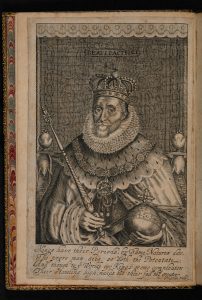 We are as sure as we can be that Shakespeare experienced the coronation of King James 1. In his pamphlet The Time Triumphant Gilbert Dugdale described the triumphal procession in London on 15 March 1604, which included the King’s Men of which Shakespeare was a leading member.
We are as sure as we can be that Shakespeare experienced the coronation of King James 1. In his pamphlet The Time Triumphant Gilbert Dugdale described the triumphal procession in London on 15 March 1604, which included the King’s Men of which Shakespeare was a leading member.
Coronations have been important for centuries in the UK, occasions when the new monarch is seen to undergo a sort of mystical transformation.
In Shakespeare’s play, Richard III unlawfully grabs the crown: characters announce the impending coronation with trepidation, and after it is over the newly-crowned king begins to show his true colours. Although it isn’t in Shakespeare’s play the coronation itself is sometimes staged in productions, as in 1984 at the RSC when at the climax of Part 1 Antony Sher knelt for the anointing, his humped back fully visible to the audience.
In Henry IV part 2, the final scene takes place just after the coronation of Henry V. Falstaff and his friends wait outside Westminster Abbey for the newly-crowned king to come by, expecting to be greeted warmly. But the coronation has symbolised the change that Henry has been warning us of:
I know thee not, old man. Fall to thy prayers….
Presume not that I am the thing I was,
For God doth know, so shall the world perceive,
That I have turn’d away my former self.
The play Henry V shows a person changed by becoming monarch. In his autobiography Beginning Kenneth Branagh recounts the story of his meeting with Prince Charles during the rehearsals for the play in 1984. Branagh was only 23 and not from a privileged background, and was finding it difficult to understand what it was like to be heir to the throne or king. The two had a private discussion at Kensington Palace. They talked about the need to suppress elements of one’s character, about the pressure of being in the public eye, about isolation and sadness, about the need to connect. This manifests itself in Shakespeare’s play with the night time scene before the Battle of Agincourt. They talked about faith and Charles’s “desire to strike a balance between responsibility and compassion”.
Branagh came away from the meeting with great respect for Prince Charles, and also wrote about the time when Charles and Diana came to see the production at the Royal Shakespeare Theatre in Stratford. Was it just a coincidence that when their second son was born a few months later he was christened Harry?
Prince Charles became President of the Royal Shakespeare Company in 1991. There have been many official visits to the town, but as in 1984 it’s the informal ones that people enjoyed most. Charles became a regular visitor to the theatre during the 90s. I remember on one occasion sitting in the stalls at the Swan Theatre when, after the rest of the audience were seated, there was a brief pause when Charles and his party were shown to their seats. Apart from the royal party being ushered to a private room during the interval the performance went on entirely normally.
Charles’s enthusiasm for Shakespeare, his enjoyment of performance, and his love of a joke, was most on show in 2016 when the RSC held a gala to celebrate the 400th anniversary of Shakespeare’s death. Paapa Essiedu, who was playing Hamlet at the time, began delivering the “To be or not to be” soliloquy only to be interrupted by Tim Minchin, then joined onstage by a host of theatrical royalty: Benedict Cumberbatch, Dame Harriet Walter, David Tennant, Rory Kinnear, Sir Ian McKellen and Dame Judi Dench. The argument over how to speak Shakespeare’s most famous line was eventually settled by the appearance from the stalls of Prince Charles “Might I have a word?” he said as he approached the stage, “I hope you don’t mind”, before delivering it with an emphasis on the final word “question”. It’s a delicious little clip, and I hope you’ll enjoy it as a contrast to all the formal pomp and ceremony of the coronation.
In case you would like to follow up a few more links between Shakespeare and royalty:
The Shakespeare Birthplace Trust has put together a page of links to Shakespeare’s royal connections, and to their own connections with the King.
This site lists the many occasions when King Charles has quoted Shakespeare:
And my own blogpost about Shakespeare and the monarchy features the story of the coronation spoon, the oldest item of royal regalia and one that will be used for the coronation.
Will there perhaps be a reference to the King’s favourite author during his coronation? I’m hoping so.



Thanks Sylvia for reminding me of that incredible clip of the great and famous speaking a version of To Be or Not to Be. The other reminder was of the glorious 1975 production of HIV part 2 at the RSC when Alan Howard became almost a gold statue at his coronation. Yesterday we saw King Charles divested of his robes down to a white shirt only to be encased in gold and with a crown so heavy he didn’t dare move his head. Finally in Michael Wood’s book “In Search of Shakespeare” (page 260) he talks about the accession of James 1 and his entry into London ” Shakespeare was not merely an actor but a royal courtier, a Gentleman Groom of the Most Honourable Privy Chamber… that he was given 4 and 1/2 yards of scarlet cloth… Shakespeare and his colleagues also had a ceremonial function in their fine scarlet.”